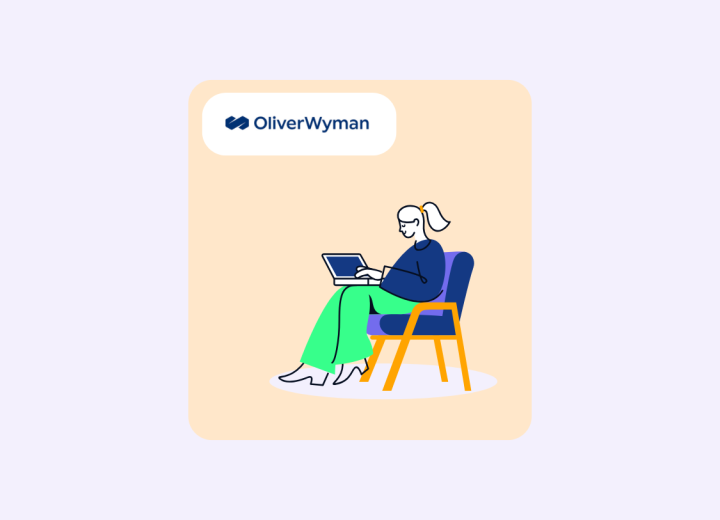You are planning to apply for a job at Oliver Wyman? In this article you will learn more about the consultancy, what kind of candidates they are looking for and what is important to them. You will also find out how the application process is structured and what types of interviews you can expect.
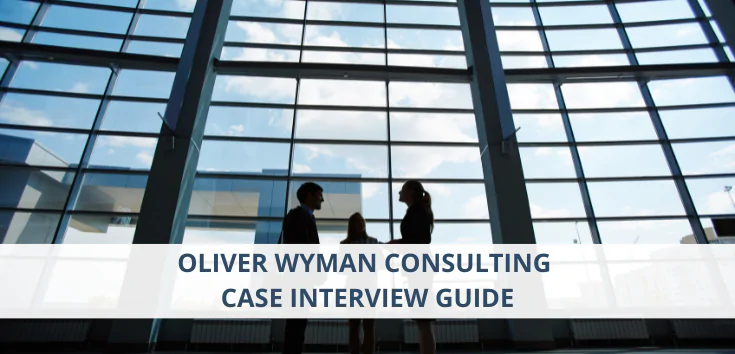
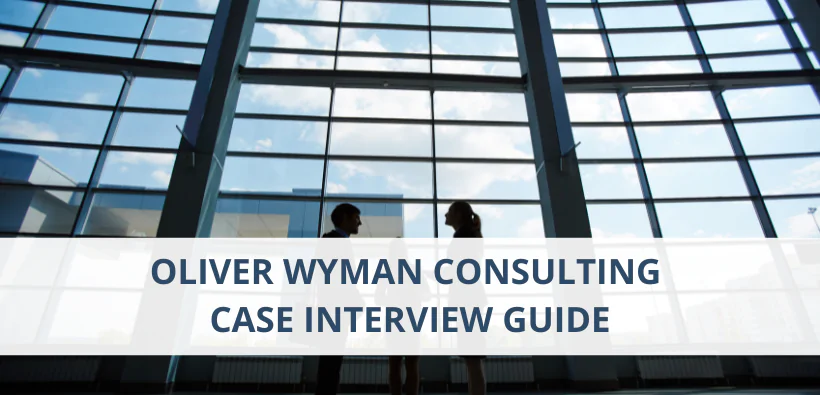
Oliver Wyman Consulting Case Interview Guide
Oliver Wyman is an American consulting firm founded in New York in 1984. They currently operate in over 60 countries worldwide, employing over 5000 people and earning revenues of $2.1bn. They are a highly reputable strategy firm, often competing against McKinsey, Bain and BCG.
The firm is part of the Marsh & McLennan group, one of the largest professional service companies in the world and part of the S&P 500. The group provides insurance, risk, reinsurance, talent management and investment advisory services alongside the Oliver Wyman consulting practice.
Every year Oliver Wyman receive thousands of applicants to their open job roles and the case interview is the main interview mechanism they use to assess candidates. It is a business problem that candidates are expected to work through with their interviewer to find an appropriate solution.
Oliver Wyman have recently shifted their focus to being impact-driven and encouraging entrepreneurial people to lead their work. They have characterized what they are looking for in a candidate in four characteristics:
Initiative
With intense workloads and imperfect information, consulting requires all levels of staff to make decisions and be proactive in their work. For junior consultants, this means anticipating what needs to be done next and not relying on a manager to completely dictate your task list.
Intuition
Oliver Wyman expects their consultants to be comfortable making decisions with imperfect information. Whilst grounding decisions in data and logic is important, certain decisions will have to be made with assumptions and being able to rely on previous knowledge to make intuitive decisions is sometimes the only way to maintain momentum in a project.
The ability to be creative is often overlooked by aspiring consultants. Creativity in the business world is to be original and find new ways of finding answers, unlocking value for clients or getting work done. Clients are looking for new insights and methods that will give them an advantage over their competitors.
Problem-solving
Every client commitment is focused around a problem they are facing and have not faced before. They are looking for a team of problem solvers that can provide a logical and structured answer to the problem.
There are four stages to the Oliver Wyman application process:
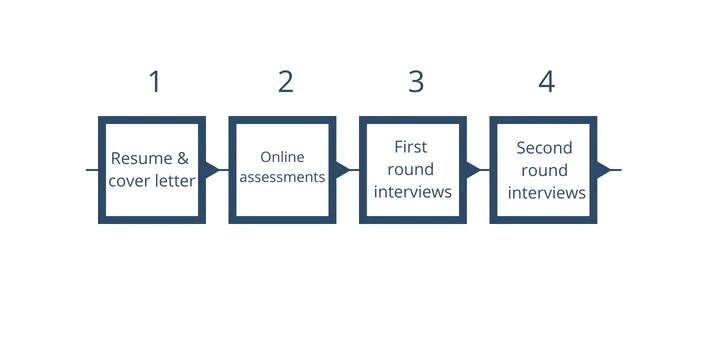
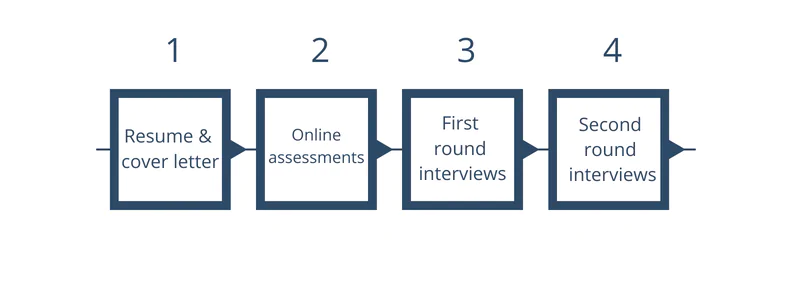
The interview process at Oliver Wyman begins with a resume and cover letter submission online. Their typical recruitment cycle is in the Autumn each year, but they do sometimes hire off-cycle, especially at smaller network firms. They are looking for candidates that reflect their four traits in their applications, along with strong academic records and relevant experience.
The Oliver Wyman online assessment is a numerical reasoning style test, commonly known as the Oliver Wyman numerical. It is a test of 23 questions involving brainteaser style numerical questions and is negatively marked.
Candidates that pass the online assessment are invited to first round interviews that are typically conducted by junior consultants and involve 15 minutes of a fit interview followed by a case interview question. There are two interviews in the first round.
The second round interviews are conducted by senior consultants (partners and directors) and follow the same format as the second round interviews. Following the second round interviews, candidates will be either given feedback or a job offer.


Oliver Wyman have two interview formats that they use across their network, a conversational interview and a case interview. The most weighting is given to the case interview, and you need to be prepared, candidates that haven’t prepared for the case interview don’t progress to the final round.
Conversational interview
The conversational interview is conducted separately to the case interview and is looking to assess four areas of your prior experience and education:
-
Interest and understanding of business
-
Professional, personal and academic accomplishments
-
Interests outside of academia and work
-
Career objectives
The combination of these four topics will build a picture for the interviewer of your motivation to work at Oliver Wyman, suitability to the work, and how you will fit in to Oliver Wyman’s culture.
Case interview
The case interview’s that Oliver Wyman use are all based on real life client examples. The interviewers are encouraged to use their own client engagements for their case interview questions because they know them well and will be able to provide data and context easily. This format is the most common interview format used by Oliver Wyman because it is the closest resemblance to the work required on the job and allows the interviewer to answer the question ‘Can this person do the work of an Oliver Wyman consultant?’
They assess candidates over a number of different attributes during a case interview:
-
Approach and structure
-
Analytical and creative thinking
-
Application of data
-
Business acumen
Scoring well across all these attributes will result in being progressed to the next stage or, ultimately, a job offer. For further information on how to demonstrate these skills, see our full case interview guide here.
Oliver Wyman vary their Case Interviews between data heavy questions and abstract questions such as ‘how much would you sell Dubai for?’ The variation in questions enables them to test your quantitative skills and communication skills separately.
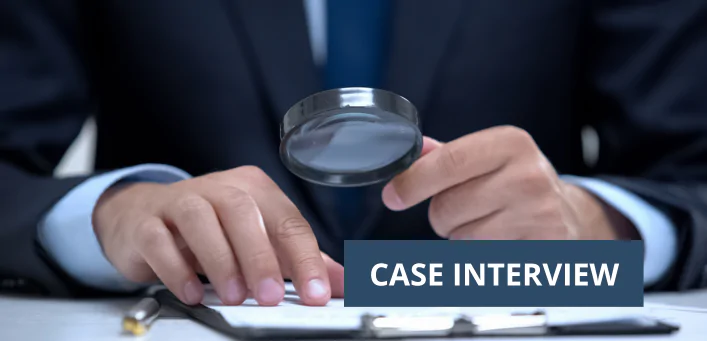

The consulting case interview is the cornerstone of every strategy consulting firm’s interview process due to the ability to replicate the problems and challenges of the work they do.
To score well in an Oliver Wyman case interview, you must meet the criteria laid out above, and you can do this following a structured approach to case interviews. The structure of an Oliver Wyman case interview is as follows:
-
Situation and problem
-
Hypothesis validation
-
Framework development
-
Root cause analysis
-
Mathematical calculation (sometimes)
-
Creativity test (sometimes)
At the start of the case, the interviewer will outline the context and the problem to be explored.
An example might be:
“A high street retailer wants to cut costs by 30% in response to the Covid-19 pandemic, how would you approach this?”
You would then be expected to put forward an initial hypothesis on what the answer might be and explain your intention to prove or disprove it.
From there, you will be expected to develop a framework to conduct your analysis and test it with the interviewer.If your framework is MECE and you explore it correctly, then you will find the root cause of the issue for the client (in this case where costs can be reduced) and begin calculations if relevant.
The creativity test is when the interviewer asks you for an alternative to your findings or recommendation, e.g. “Okay, the client says they do not want to shut stores, how else can they reduce cost?” They may ask this more than once, and it tests the candidate's ability to think of alternatives, even if their answer is appropriate.
Finally, you will be asked to provide a recommendation, whereby you need to synthesize your findings and give a clear and concise proposal. For more information on how to approach and solve case interviews, read our full guidance here.
Fast math
Case interviews are pressurized situations where your anxiety levels are heightened, and you don’t have the safety net of notes or the internet to fall back on.
For in-person interviews, it is common that one of the questions will have a mathematical element or be a market sizing question included. These require long math calculations without a calculator. If you haven’t practiced long addition, multiplication, division or subtraction recently then it is a good idea to do so. Being quick at math shows your competent quantitative skills and reduces unnecessary pressure during the interview, increasing your overall performance.
Practice
As with the math, practicing case interviews is the best way to improve your performance. Through practice, you will begin to develop a robust approach that satisfies the structure and framework components of the case, and you will recognize how to navigate the case successfully.
If you are applying to Oliver Wyman then you are probably applying to other strategy consulting firms too, this practice will be relevant to all the firms you apply to as they all use case interviews in their application process.
Apply structure to everything
The key requirement of a candidate in a case interview is the application of structure, specifically with a MECE approach. As mentioned above, you can even apply structure to the FIT questions, and it is recommended you do so.
An example answer to the question ‘walk me through your CV’ would be to segment your experience into:
1) Experience relevant to consulting, 2) Experience not relevant to consulting, and then briefly cover the experience you have in each bucket. This shows you understand what consulting is and what is relevant, and also a key skill of a consultant – structured thinking.
If you can demonstrate robust structured thinking in your interview, you will score highly.
Continue to Learn
